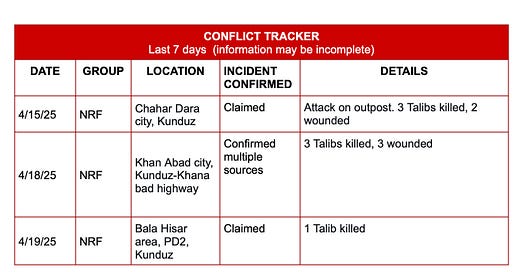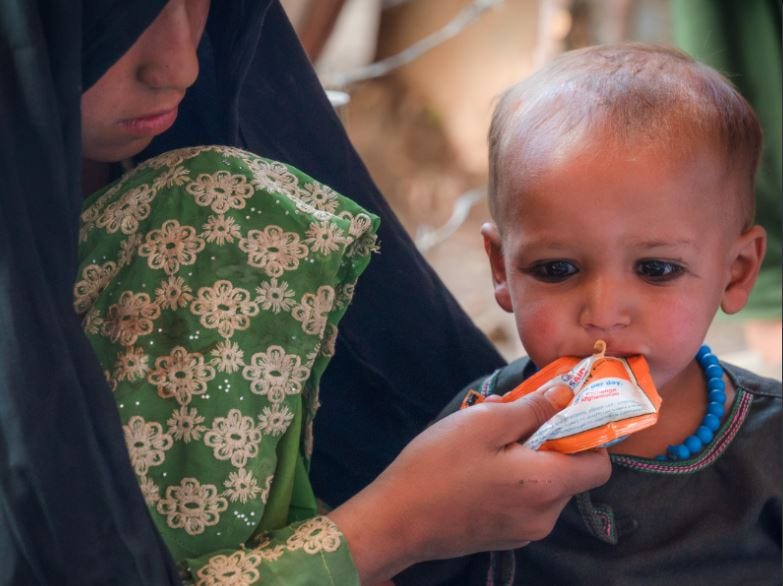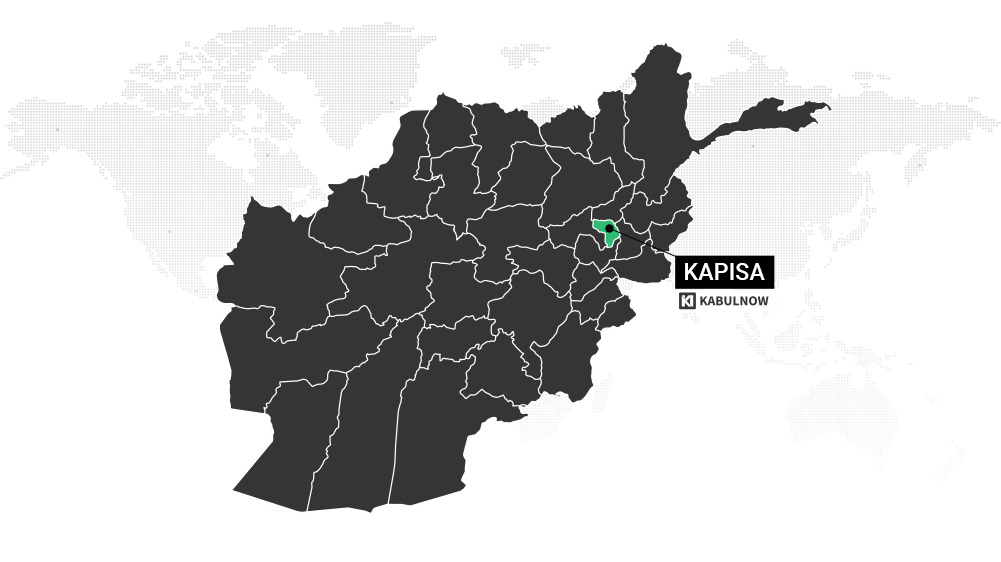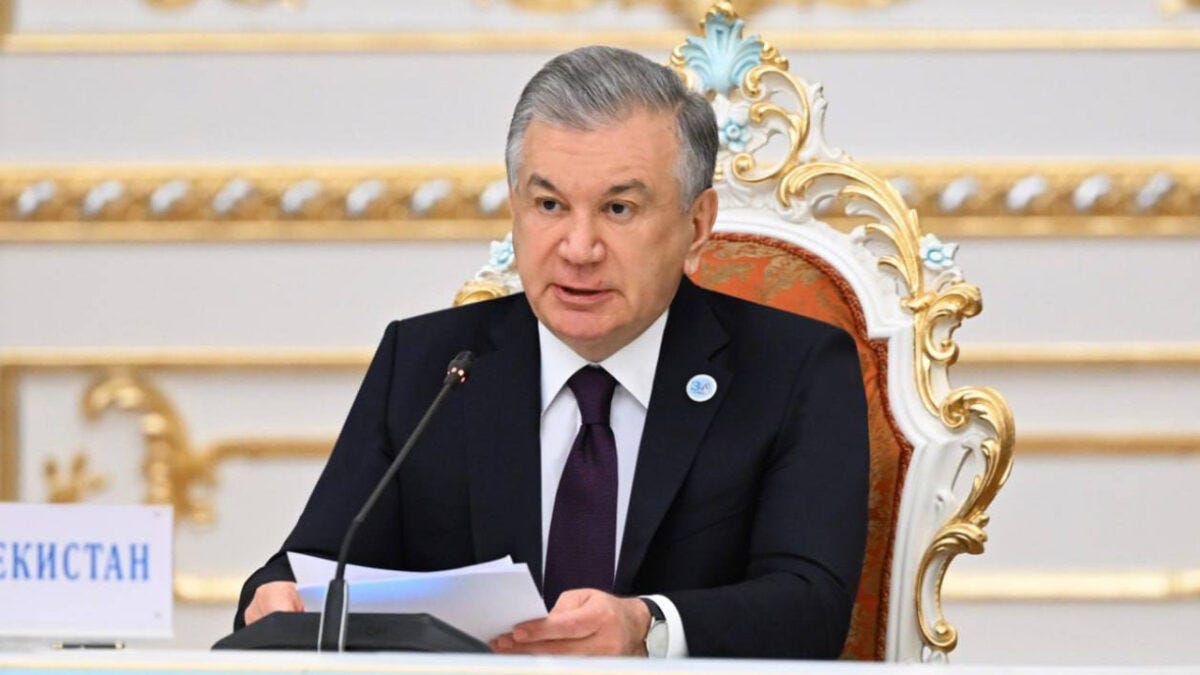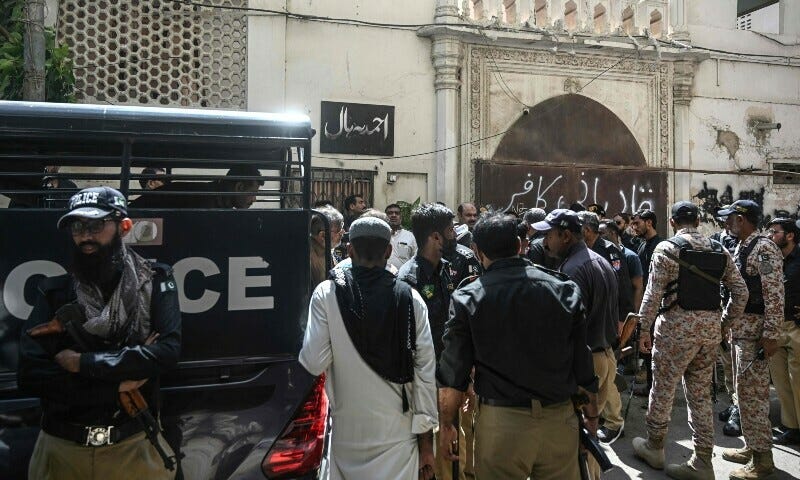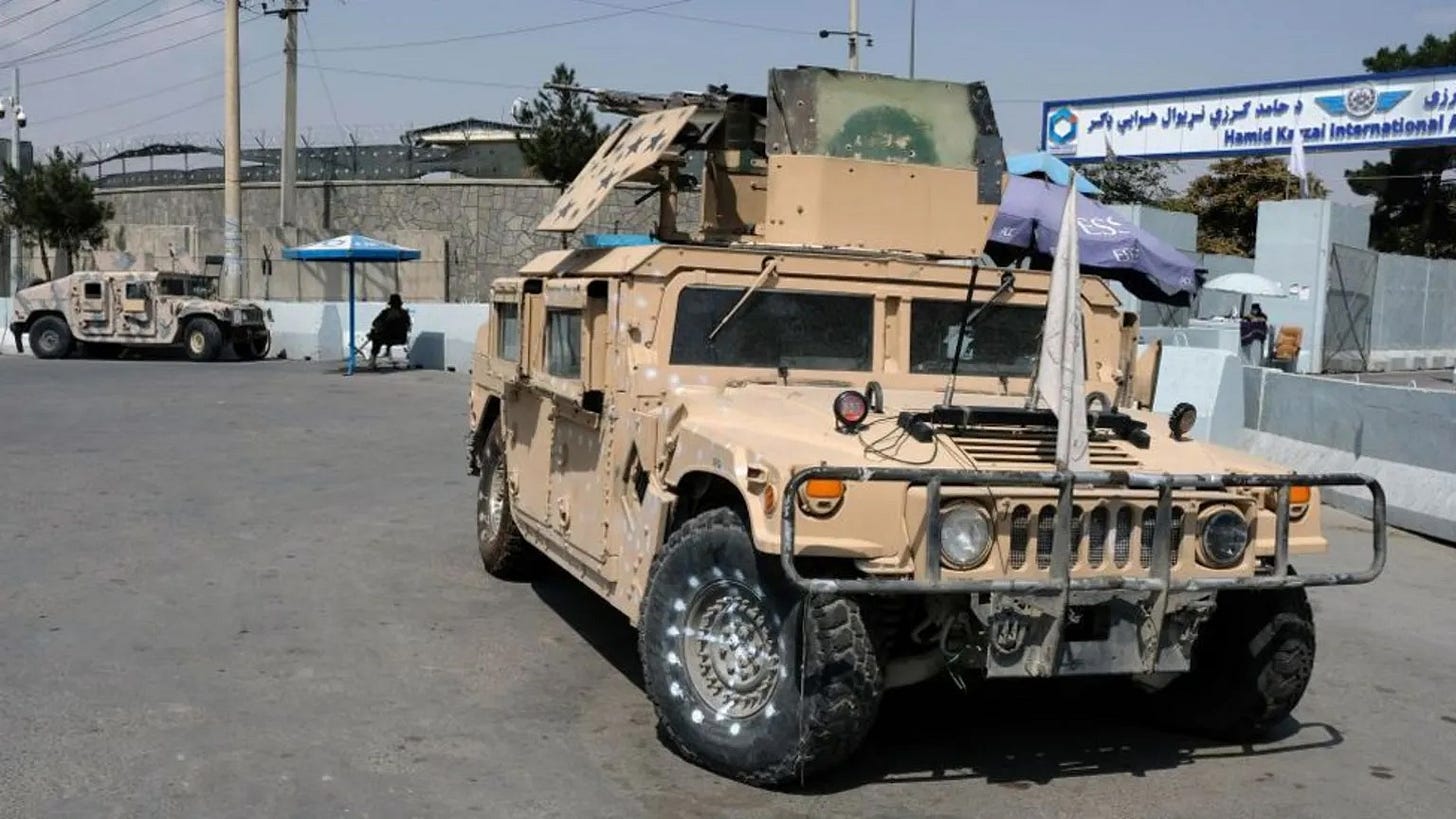The Week of April 14-20
Security and Conflict
Attack in Mazar – On Monday at around 8:20 a.m., an explosion occurred near the Seh Dokan Mosque, a Shiite place of worship in Mazar-e-Sharif’s PD2. Local sources report that one woman was killed and six others were wounded, including one critically. The blast occurred in a crowded area and was caused by a planted improvised explosive device, according to witnesses. The mosque was previously targeted by ISKP in April 2022, resulting in over 30 deaths and 80 injuries. Taliban officials in Balkh Province have yet to issue a public statement, and no group has claimed responsibility for the attack.
Cross Border Fighting – On Monday, TTP militants attempted to cross into Pakistan from Kamdish district in Nuristan, sparking a one-hour clash with Pakistani border forces. The fighters were pushed back to Gawardesh, after which Pakistani troops fired more than 45 mortar rounds into the area. Casualties were reported and transferred to Kunar Provincial Hospital, where medical sources confirmed injuries.
Khalilizad Warns Terrorists could Infiltrate Returnees from Pakistan – On Thursday, former U.S. envoy Zalmay Khalilzad warned that Pakistan may be using the deportation of Afghan refugees to covertly transfer Islamic State militants into Afghanistan. His remarks reflect escalating tensions between Islamabad and the Taliban, who accuse each other of harboring cross-border militants. The Taliban claim that recent ISIS-K attacks originated from Pakistan’s Balochistan Province, while Pakistan accuses the Taliban of sheltering TTP fighters. Both countries face growing militant threats, with rising ISPP and TTP activity since the Taliban's return to power.
Talibs Attacked on Road to Jawzjan – On Sunday, two Taliban intelligence officers were ambushed by unknown gunmen on the Qarqin–Mardian road in Jawzjan. The attack killed Qari Abdullah and seriously injured Jalaluddin. The perpetrators remain unidentified, and no group has claimed responsibility.
Human Rights and Civil Liberties
Taliban Arrest Social Media Influencer – On Wednesday, multiple sources reported that the Taliban arrested Afghan-Canadian influencer Nadima Noor, known online as Batingara Kakai. Noor, founder of Dream Voice Act, last posted on YouTube on March 13, 2025. Although the arrest has not been officially confirmed, it follows a 2022 detention. Noor has drawn criticism for promoting pro-Taliban narratives and portraying Afghanistan’s situation more positively than widely reported.
Floggings – On Monday, four individuals were flogged in Ghazni and Ghor. On Thursday, 15 people were publicly beaten in Uruzgan, one in Zabul, and two in Kabul.
Internal Politics
Economic Committee Drafts National Development Strategy – On Tuesday, the Taliban’s Economic Commission, chaired by Mullah Baradar, approved a five-year National Development Strategy aimed at fostering stability, prosperity, and international cooperation. The plan emphasizes the enforcement of Sharia law, economic growth, transparency, regional connectivity, improved services, employment creation, and environmental protection. Prepared by the Ministry of Economy with support from other ministries, the strategy envisions a stable Afghanistan with positive international ties. However, concerns persist over discriminatory practices, including the relocation of economic and humanitarian projects from non-Pashtun to Pashtun regions.
Vice and Virtue Ministry Meeting Held – In a closed-door gathering in Kabul on Sunday, Taliban Acting Vice and Virtue Minister Khalid Hanafi defended the implementation of Islamic law on all citizens, including Taliban officials. His statement followed the public execution of four individuals across three provinces, as part of a renewed push to enforce Sharia law. Since their return to power, the Taliban have carried out at least 855 public floggings, 178 retribution sentences, and 10 executions—exclusively targeting ordinary citizens, not Taliban members. Hanafi emphasized accountability among leaders, but activists criticized the regime's hypocrisy, citing Taliban officials accused of crimes who face no punishment. The selective enforcement also extends to bans on women’s presence and media imagery.
Taliban Set up Hotline for Rent Gouging – Amid a sharp rise in housing costs in Kabul, driven by the return of tens of thousands of Afghan refugees from Pakistan and Iran, the Taliban’s Ministry of Justice has launched hotlines for reporting landlords or brokers accused of price gouging. According to IOM Afghanistan, around 60,000 Afghans have returned from Pakistan in the past two weeks. Reports indicate that returnees face inflated rents and substandard living conditions.
International Developments
Russia Removes Taliban from Terrorist List – On Thursday, in a closed-door hearing, the Russian Supreme Court suspended the Taliban’s designation as a terrorist organization, effective immediately. The decision followed a request by the Prosecutor General’s Office and applied a 2024 legal amendment. Russia had designated the Taliban a terrorist group since 2003. The ruling now allows for formal legal cooperation. Kazakhstan and Kyrgyzstan previously made similar moves. Moscow already maintains diplomatic contact with Taliban officials.
UNAMA Head Visits Paktia – On Tuesday, Roza Otunbayeva, head of UNAMA, visited Paktia Province and met with Taliban Deputy Governor Inamullah Salahuddin to discuss security, economic development, and Pakistan’s deportation of Afghan migrants. She reportedly criticized the deportations and pledged UN support for agriculture, education, and services for returnees. Taliban officials said they urged the UN to help improve ties with the international community. UNAMA has not yet commented publicly on the visit.
Red Crescent Warns of Risks to Deportees – The International Federation of Red Cross and Red Crescent Societies has raised concerns over Pakistan's forced deportation of migrants, particularly ACC holders. The crackdown has included police detentions and the demolition of informal housing, exacerbating fear among displaced groups. Migrants face limited healthcare access and perilous return journeys, with approximately 20,000 crossing daily as of April 1, 2025. The Red Cross urged urgent humanitarian aid, warning of strained services amid funding cuts. Vulnerable populations are at heightened risk.
Germany Moves Approved Afghans from Pakistan – On Thursday, a plane carrying 138 vulnerable Afghans arrived in Leipzig, sparking political debate in Germany. The evacuees, previously promised legal asylum, included women and children fleeing Taliban threats. Critics argue the outgoing government is accelerating admissions, possibly fueling far-right backlash, while supporters assert the move honors Germany’s humanitarian commitments. With 2,600 Afghans still in Pakistan, the future of such programs under the new coalition remains uncertain.
Freedom of the Press
Journalist Arrested – On Wednesday, journalist Rashid Kashifi was detained by the Taliban near his residence in Kabul. He has previously worked for outlets including The Kabul Times and Rasa TV. This is his second known arrest; in December 2021, he was reportedly beaten during detention. The Taliban have not commented. At least 10 journalists remain in Taliban custody over charges related to their professional work.
Media banned from Using images in Kunduz – The Afghanistan Journalist Center reports that the Taliban have officially banned media and government agencies in Kunduz from publishing live images. This expands existing restrictions already enforced in the provinces of Kandahar, Takhar, Badghis, Helmand, Nangarhar, Nuristan, Farah, Nimroz, Badakhshan, Baghlan, Jawzjan, Zabul, and Parwan.
Regional Developments
Pakistan Foreign Minister visits Kabul – On Sunday, during Pakistani FM Ishaq Dar’s Kabul visit, Taliban leaders urged Pakistan to stop expelling Afghan refugees and instead support a respectful, coordinated return. Taliban PM Mullah Hasan assured that Afghan territory would not threaten neighbors. FM Muttaqi expressed deep concern over refugee deportations, though Pakistan’s statements omitted this issue. Despite Taliban claims that Dar promised fair treatment for refugees, deportations continue, with 4,300 expelled a day before the visit. Talks also focused on security, trade, transit, diplomatic ties, visa facilitation, and regional infrastructure projects like CASA-1000 and TAPI.
Afghanistan-Pakistan Joint Coordination Committee Meets in Kabul – On Wednesday, the Afghanistan–Pakistan Joint Coordination Committee reconvened in Kabul for its seventh round of talks, ending a 16-month pause in dialogue. The meeting, led by Taliban Deputy Defense Minister Abdul Qayyum Zakir and Pakistan’s Special Envoy Sadiq Khan, focused on border security, cross-border movement, and trade disruptions. Talks were held amid heightened tensions over militancy, refugee deportations, and prolonged border closures. A follow-up session is expected in Islamabad. Separately, Acting Afghan Trade Minister Nooruddin Azizi is leading a delegation to Pakistan to strengthen economic cooperation.
Afghan Executed in Saudi – On Monday, Saudi authorities executed Afghan citizen Padshah Sulaimani in Mecca for heroin smuggling. He reportedly confessed during his trial. The sentence, upheld by the Supreme Court, was carried out by order of the king.
Kazakhstan Sends Humanitarian Aid to Afghanistan – On Thursday, a humanitarian shipment from Kazakhstan arrived in Balkh via the Hairatan port. Delivered by Gaziz Akbasov of the Kazakh Embassy, the aid included 1,000 tons of flour, 1,243 tons of rice, 1,000 liters of oil, tents, and blankets. Taliban officials said the supplies, transported in 36 wagons, will support vulnerable communities in northern Afghanistan.
NEXT WEEK
In Afghanistan, the Taliban have responded to international criticism of recent public executions and floggings by increasing the use of public punishment. All residents should remain cautious, as individuals may be arbitrarily charged with moral crimes.
Flooding is likely this week due to forecasted heavy rains in Badakhshan, Takhar, Nuristan, Kunar, Laghman, Kapisa, Panjshir, and Baghlan. These spring rains may disrupt travel and cause damage to homes and property.
In Pakistan, the deportation of ACC holders is ongoing. Authorities have conducted house-to-house searches for Afghans in several cities, with similar operations and checkpoint inspections expected to continue. Deportations of Afghans awaiting third-country relocation are confirmed to continue through April 30, while individuals holding PoR cards face deportation starting June 30. All Afghans in Pakistan are strongly advised to carry valid visas and identification at all times.
Deportations are also continuing in Iran. Afghans there are urged to maintain valid visas and documentation at all times but should be aware that legal documentation does not necessarily prevent harassment, extortion, detention, or deportation in either Iran or Pakistan. Vulnerable Afghan populations in both countries are advised to exercise caution, as deportees face a heightened risk of being targeted by the Taliban upon return—potentially under accusations of affiliation with IS or other terrorist groups.
In the United States, Afghans who have received self-deportation notices related to TPS or Parole status are urged to seek immediate legal advice from an immigration attorney, even if they believe the notice was sent in error.
Afghans recently arrived in the U.S. have reported an increase in scam calls from individuals impersonating ICE. Everyone is reminded to be aware of their rights and to never share personal information over the phone. If contacted by someone claiming to be from ICE or the police, reach out to a trusted U.S. contact or attorney for guidance.
A travel ban affecting Afghan nationals seeking entry to the U.S. remains likely, although the timeline for implementation is unclear. SIVs with valid visas in their passports are strongly encouraged to travel to the United States as soon as possible, as new restrictions may take effect once the ban is enacted.
Housing and resettlement assistance for new arrivals remains limited. Individuals arriving in the U.S. should ensure they have a local support system in place to assist with initial expenses and accessing available benefits. All Afghans in the U.S., including Green Card holders, are advised to avoid international travel at this time.
Resources for Afghans are available:
Parole assistance – Here
Resources for recent SIV arrivals – Here
Support for recent refugee arrivals – Here
Updates on U.S. visa cases and legal developments – Here
REGIONAL ROUNDUP
IRAN
Employers Warned Against Hiding Employment of Afghans – On Saturday, Iran's judiciary warned employers against providing false information or obstructing inspectors regarding Afghan migrant workers, Mehr News Agency reported on Sunday. Legal penalties will apply to violators as Tehran intensifies its crackdown on undocumented Afghans. Several provinces now ban the employment of migrants without valid documentation.
Iran Repatriates More Than One Hundred Afghan Inmates – On Thursday, Iran transferred 199 Afghan prisoners to the Taliban via the Silk Bridge border crossing in Nimroz Province, as part of a broader agreement to repatriate 484 Afghan inmates held on criminal charges. The Taliban also returned two Iranian prisoners as a goodwill gesture. The exchange follows recent negotiations aimed at enhancing cooperation on prisoner transfers between Tehran and the Taliban administration.
PAKISTAN
Deportations Continue – Nearly 27,000 Afghan migrants entered Afghanistan via the Torkham and Spin Boldak crossings over the course of one week, with daily arrivals ranging from 3,000 to 5,000, according to Taliban figures. Reports indicate that more than 80,000 Afghans have returned from Pakistan in three weeks, through both voluntary and forced deportations. Many face uncertainty upon return, lacking shelter, food, and employment. Human rights activists highlight the harsh and unsupported return of individuals who had lived in Pakistan for decades.
Raids and House to House Searches in Islamabad – Early Tuesday, police raided homes in Islamabad’s B-17 sector, a neighborhood with a significant Afghan migrant population, detaining several residents, including women and children. Detainees were transferred to Haji Camp for processing. Similar raids and detentions have been reported in cities across Pakistan.
SPOTLIGHT ANALYSIS
Terrorism remains a persistent global threat, with 2024 marking another year of shifting patterns and evolving challenges with the geographic reach of terrorism spreading. The number of countries experiencing at least one terrorist incident increased from 58 to 66, the most countries affected since 2018. In 2024, more countries deteriorated than improved for the first time in seven years, with 45 countries reporting a higher impact from terrorism, while only 34 showed improvement.
Islamic State (IS) and its affiliates remained the deadliest terrorist organisation in 2024, responsible for 1,805 deaths across 22 countries. The four major terrorist organisations, IS, Jamaat Nusrat Al-Islam wal Muslimeen (JNIM), Tehrik-e-Taliban Pakistan (TTP), and al-Shabaab continued to increase their activity, with deaths attributed to these groups increasing by 11 per cent to 4,204. In 2023, these groups were active in 29 countries which increased to 30 countries in 2024.
In 2024, 36 per cent of terrorist attacks were not claimed by an organisation. IEP has developed a machine learning model to assign these incidents to likely groups. The analysis found that deaths attributed to IS would have been 58 per cent higher, while those linked to JNIM would have been 176 per cent higher. This underscores the challenges in accurately assessing the impact of different terrorist organisations.
AFGHAN NEWS
Afghanistan Faces Record-Breaking Rise in Malnutrition, WFP Warns
Kabul Now
Afghanistan is grappling with the sharpest rise in malnutrition ever recorded, the World Food Programme (WFP) has warned, describing the crisis as “record-breaking” and one that threatens the lives of millions of children.
In a post on X (formerly Twitter) on Wednesday, the UN agency said that an estimated 3.5 million children are projected to suffer from malnutrition in 2025. The WFP urged sustained international funding to keep critical aid operations running and save lives.
Man Kills Wife and Two Relatives in Afghanistan Amid Surge in Domestic Violence
Kabul Now
From January 2022 to June 2024, Afghan Witness, a project by the Center for Information Resilience, documented 700 incidents of violence against 840 women and girls. These cases included femicide, physical abuse, sexual assault, torture, enforced disappearances, and other forms of violence targeting women and girls.
The Taliban has closed all women’s protection centers, which were set up under the previous government to support female survivors of domestic violence. The regime has also dismantled legal and institutional frameworks that once protected women and girls, leaving many trapped in a cycle of violence with no access to justice.
Taliban Orders Closure of Hekmatyar’s Hezb-e-Islami Offices, Arrest of Members
Kabul Now
The Taliban have ordered the closure of all Hezb-e-Islami offices across Afghanistan, led by former warlord Gulbuddin Hekmatyar.
The group’s Ministry of Justice instructed provincial offices to shut down local branches, seize equipment, and arrest staff members.
Hekmatyar’s son, Habib-ur-Rahman Hekmatyar, posted a copy of the directive on X on April 14.
REGIONAL NEWS
Exclusive: Fearing IMU, Uzbekistan turns to Taliban
Yasin Shayar
Uzbekistan has quietly expanded its diplomatic and economic engagement with the Taliban in recent years — a strategic shift that, according to analysts and former Afghan intelligence officials, is driven by mounting concern over the Islamic Movement of Uzbekistan (IMU), a regional militant group with deep historical ties to Afghanistan’s insurgency.
The IMU, formed in 1998 by Islamist hardliners Tahir Yuldashev and Juma Namangani, originally sought to overthrow Uzbekistan’s secular government. After a harsh crackdown by then-President Islam Karimov, the group’s fighters fled to northern Afghanistan and Pakistan’s tribal areas, where they forged alliances with the Taliban and Al Qaeda.
Ahmadi man lynched as TLP supporters storm worship place in Karachi’s Saddar: police
Imtiaz Ali and Nadir Guramani
A 46-year-old businessman was lynched when a few hundred supporters of the religiopolitical party Tehreek-i-Labbaik Pakistan (TLP) stormed a place of worship belonging to the Ahmadi community in Karachi’s Saddar area on Friday to prevent it from observing religious rituals, according to officials.
Speaking to Dawn.com, South Deputy Inspector General of Police (DIG) Syed Asad Raza said the deceased owned a shop at Tariq Road. As soon as he learned about TLP supporters storming the Ahmadiyya Hall in Saddar, he closed his shop and went to the site of the incident.
INTERNATIONAL NEWS RELATING TO AFGHANISTAN
US weapons left in Afghanistan sold to militant groups, sources tell BBC
Yasin Rasouli & Zia Shahreyar
Half a million weapons obtained by the Taliban in Afghanistan have been lost, sold or smuggled to militant groups, sources have told the BBC - with the UN believing that some have fallen into the hands of al-Qaeda affiliates.
The Taliban took control of around one million weapons and pieces of military equipment - which had mostly been funded by the US - when it regained control of Afghanistan in 2021, according to a former Afghan official who spoke to the BBC anonymously.
As the Taliban advanced through Afghanistan in 2021, many Afghan soldiers surrendered or fled, abandoning their weapons and vehicles. Some equipment was simply left behind by US forces.
Afghani to the Dollar: $1 – 71.91 AFN (As of April 20)

